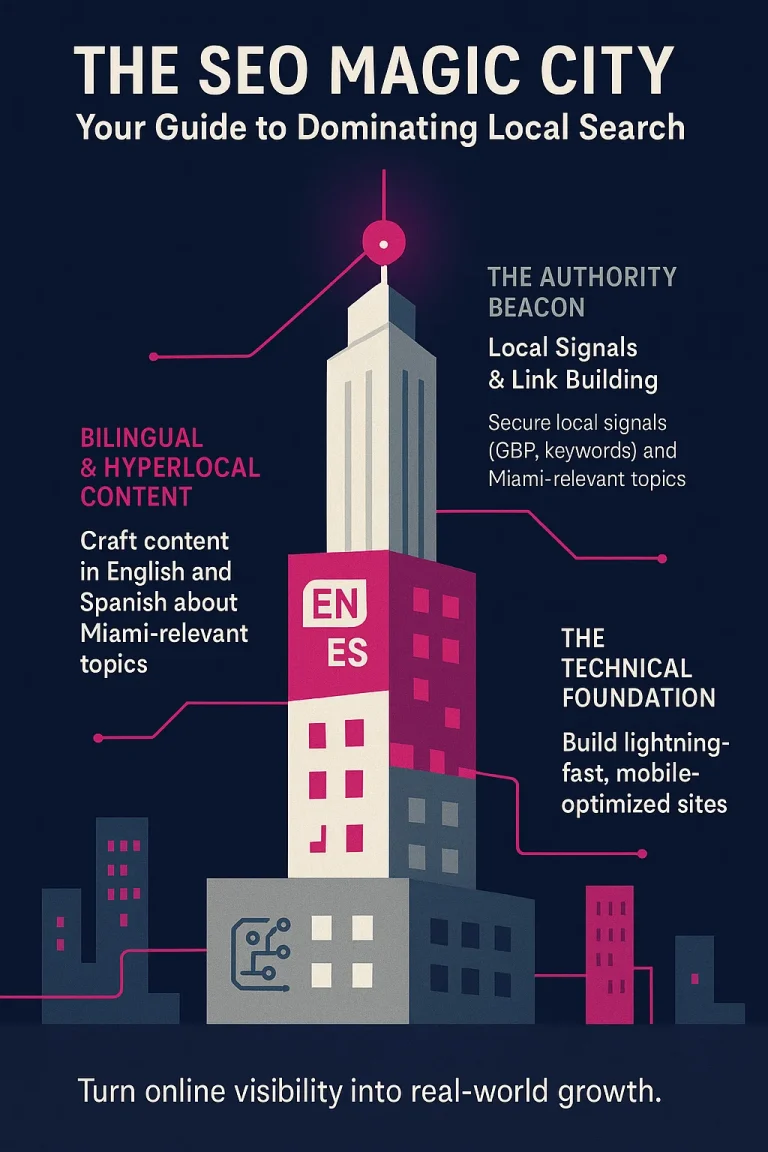Shop
- About Us
- Our Services
- Blog
- Contact Us
Services
- SEO Services
- PPC Services
- GMB Optimization
- Web Design
Locations
- Los Angeles
- New York City
- Chicago
- Miami

Miami’s tech ecosystem is booming. From Brickell’s finance and fintech-driven skyline to Wynwood’s creative and innovation hubs, Miami has transformed into a top-tier startup city. In fact, recent studies show Miami skyrocketing in the global startup rankings – it’s now the 4th-largest US startup hub (valued at $36 B) and hosts 429 fintech startups. Venture funding has exploded too, with Miami’s startups raising $2.41 B across 393 deals in 2023, and continuing momentum into 2024. However, with this growth comes fierce competition. In Miami’s multicultural market (47% Latino population, 43% Spanish-fluent), a generic national SEO strategy won’t cut it. Startups must craft Miami-specific SEO strategies – blending local SEO tactics, bilingual content, and technical excellence – to stand out. For expert help, explore our Miami SEO services.
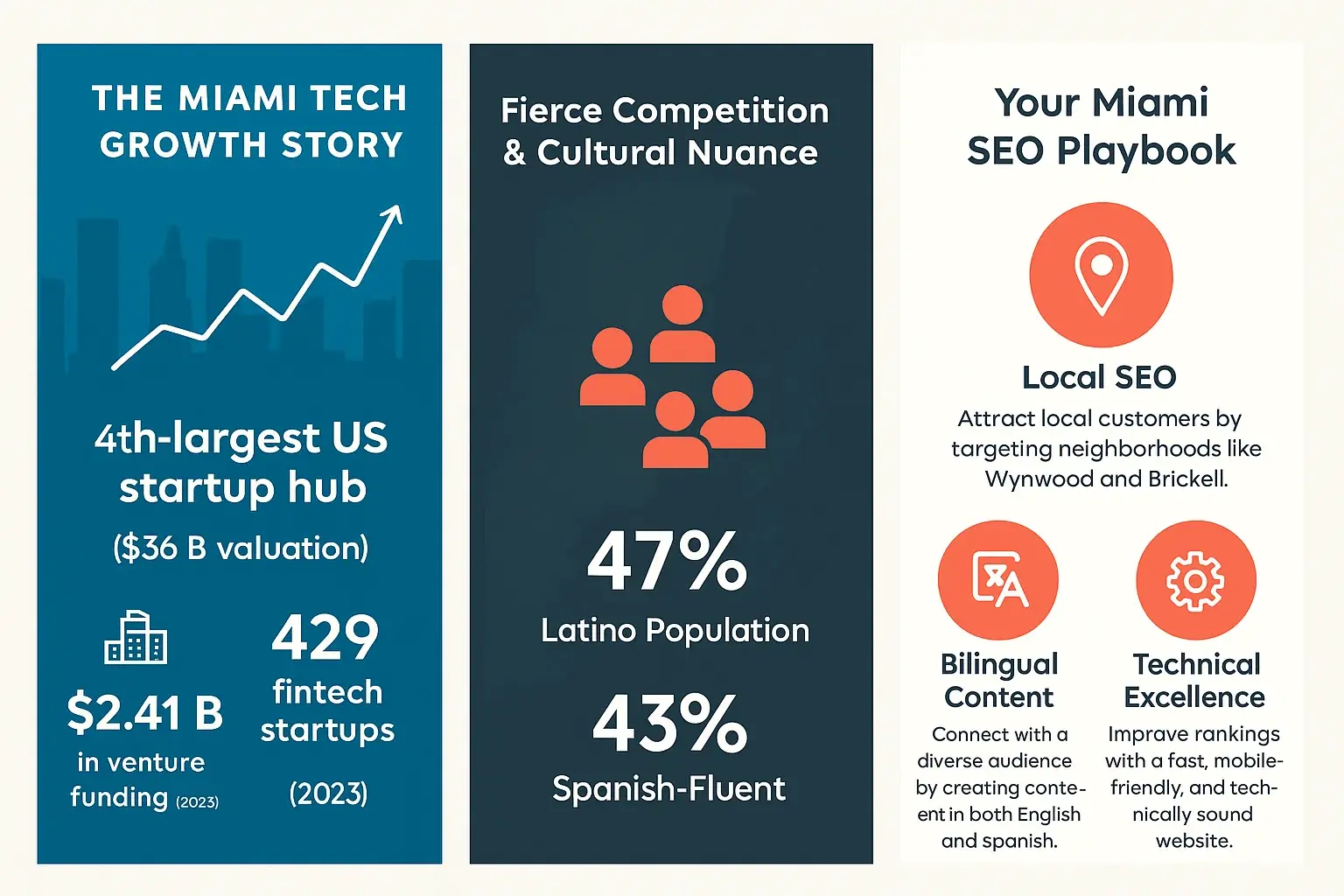
Miami’s unique marketing “pulse” demands bilingual, culturally-relevant content, flawless websites, and agile event-driven campaigns. Nearly two-thirds (66%) of Miami-Dade households are Spanish-speaking, so “Miami SEO” must go beyond English-only. Brickell’s cutthroat tech scene means pages must load in a flash and content must establish authority. And with landmark events like Art Basel and F1 Miami spiking interest, SEO must adapt to seasonal surges. In this playbook, we’ll dive into the data and strategies that help tech startups – from fintech to healthtech – succeed in Miami. We’ll cover market context, technical SEO foundations, content strategy (especially bilingual/local content), link building, and key metrics. Wherever you are (Brickell skyscrapers or Wynwood lofts), these Miami-savvy SEO tactics will guide your marketing.
To capture demand surges around Art Basel and the Miami Grand Prix, invest in Miami PPC advertising to complement your always-on SEO.
Miami’s entrepreneurial surge is well documented. A Stripe report (2023) named Miami the fastest-growing US startup hub, with nearly 89% more breakout companies in 2021–22 vs. 2016–17. StartupBlink and RefreshMiami data confirm the trend: Miami jumped seven places to rank 16th globally in the 2024 Global Startup Ecosystem Report. Venture capital has followed suit: Miami-area startups captured $1.6 B in funding across 249 deals in 2024, and for 2023 overall that totaled $2.41 B. The fintech sector is especially robust – Miami is home to 429 fintech startups, accounting for 41% of tech deals, and $859 M flowed into crypto projects.
These figures highlight why Miami tech startups marketing needs a sharp edge. Local market dynamics – a growing international financial hub with strong Latin American ties – create both opportunity and complexity. For example, Miami’s economy is multilingual by nature: roughly 47% of residents are Latino, and many businesses cater to Spanish-speaking customers. Multicultural events (Art Basel, Carnaval Miami, LatinX conferences) dominate the calendar, driving episodic surges in local search interest. This means an SEO strategy in Miami must be data-driven and hyperlocal.
Startup Growth: Ranked #23 to #16 globally (2023–24); city valuation $36 B.
Venture Funding: Over $2B/year flowing in (2023: 393 deals, $2.41 B).
Tech Verticals: Fintech (41% of VC deals), healthtech/biotech (e.g. MDLive’s $1B exit), climate tech. Miami houses major initiatives like eMerge Americas and climate-tech accelerators.
Diversity: 47% Latino, 43% Spanish-fluent – a bilingual consumer base.
Entrepreneurial Climate: Favorable tax laws (no state income tax) and high quality of life attract talent.
These factors translate into specific SEO considerations. Miami’s rising stature has led to intense online competition: businesses must deliver fast, authoritative websites and standout content just to be visible. At the same time, the large Hispanic market means Spanish-language search queries and culturally relevant messaging cannot be ignored. In short, Miami startups need an SEO playbook tailored to local context.
No SEO playbook is complete without a rock-solid technical base. Miami’s consumers – tech-savvy and mobile-first – expect blazing-fast, secure websites. Google’s Core Web Vitals and PageSpeed benchmarks must be met or exceeded. For Miami in particular, a mobile-first design and fast-loading speed are paramount given Miami’s high smartphone usage. Practical steps include compressing images, enabling browser caching, minifying CSS/JS, and using CDNs to serve local content quickly. A Core Web Vitals audit should be standard practice for all startup sites. Need help implementing it? Our technical Miami SEO services can handle the full audit and fixes.
Other technical must-haves:
hreflang annotations so Google serves the correct language to users. This avoids duplicate content issues between your bilingual pages. And be sure to humanize translations. Google penalizes machine-translated content without human review, so invest in quality Spanish SEO copy rather than “Google Translate English” material.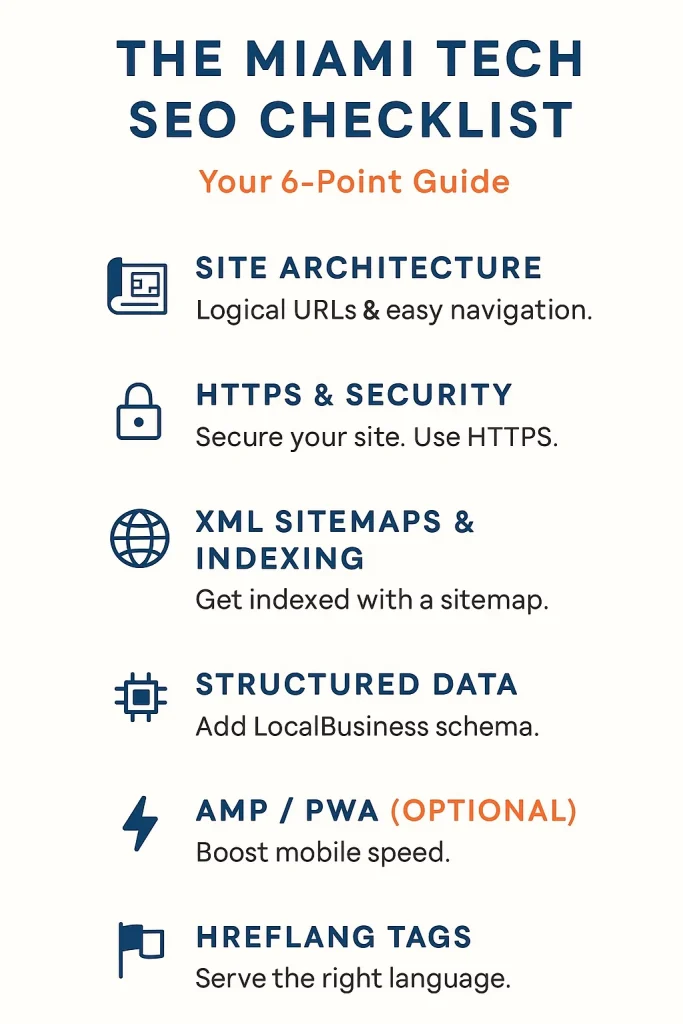
In short, site health must be stellar. An optimized Miami site has “a clean, logical structure, fast loading speeds, and a mobile-first design”. Don’t overlook technical SEO: it’s the groundwork that enables all other strategies to succeed.
Content is king everywhere – but in Miami’s multicultural market, whose languages and cultures you speak matter just as much as what you say. A winning content strategy for Miami tech startups hinges on two pillars: bilingual, culturally relevant content and hyperlocal relevance.
Nearly 30% of U.S. online media consumption comes from users toggling between Spanish and English. In Miami, where 47% of people are Latino, ignoring Spanish is a missed opportunity. Studies show only ~2% of U.S. websites have Spanish content, even though there is huge demand. Startups that publish Spanish-language content can capture new audiences – it’s lower competition and often lower ad costs (Google observed 3.5× lower CPC on Spanish queries, with 5.7% more clicks).
Action Items:
Maintain content in both English and Spanish. For example, blog posts, product pages, and landing pages should have a fully human-reviewed Spanish version. Use geo-targeted keywords in Spanish (e.g., “agencia SEO Miami”, “servicios SEO para startups”, “fintech Miami”) and meta tags. For execution support, see our bilingual Miami SEO services
Tailor messaging to local culture. A fintech startup might explain banking concepts in Spanish context, or a healthtech company might reference local healthcare needs. Use imagery and examples that reflect Miami life and Hispanic culture.
Build separate content plans for each language, tracking keywords independently. Tools like SEMrush or Ahrefs can show what Spanish phrases your audience is searching.
In practice, this means your editorial calendar includes Spanish- and English-written pieces. For instance, a blog could alternately publish “Top 5 Miami Fintech Trends” (English) and “Principales tendencias fintech en Miami” (Spanish), targeting different keyword sets. According to MotionPoint, this bilingual approach is “the only way” to reach growing Spanish-speaking audiences.
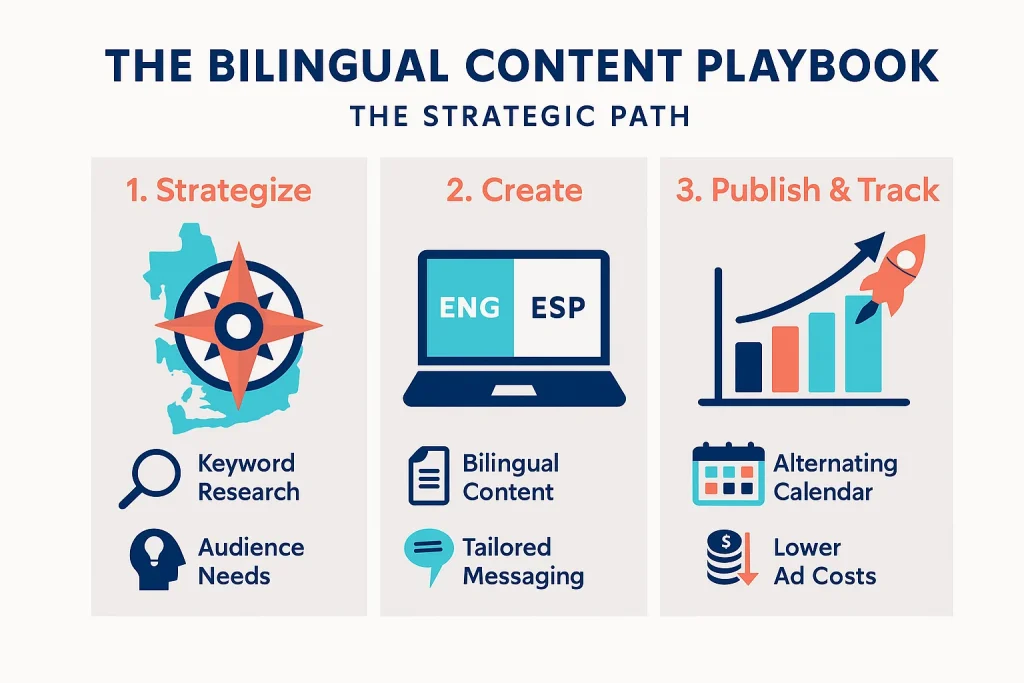
Miami’s neighborhoods each have their own flavor (Brickell’s finance hubs, Wynwood’s art tech, Little Havana’s culture, etc.), and your content should reflect that. If your startup is based in Wynwood, write about Wynwood tech meetups or coworking in the Design District. If you have a Brickell office, publish posts about Miami finance, banking partners, or even sponsor articles about Brickell trends. This hyperlocal content helps you rank for “local SEO Miami” queries and establish relevance.
Neighborhood Landing Pages: Consider separate pages for major areas (e.g., “Tech Startup Services in Brickell” or “SEO Agency in Wynwood”). Optimize each with local keywords and unique content about that locale.
Local News & Events: Cover local tech news, such as funding rounds for Miami startups, partnerships with University of Miami, or coverage of Miami Tech Week and eMerge Americas. Publish event recaps or insights (e.g. “Lessons from eMerge 2024 for AI Startups”), which naturally tie your site into the Miami tech conversation.
Hyperlocal Keywords: Use tools to find popular “near me” and neighborhood queries. Phrases like “Miami tech startup incubator”, “SEO Miami Beach”, or “fintech accelerator Miami” might have less competition and high intent.
Vertical Content (Fintech, Healthtech, etc.): Align content with Miami’s strongest sectors. For instance, because Miami has 429 fintech companies, a fintech startup should produce thought leadership on financial tech, crypto regulations, or payment security. This establishes topical authority. For healthcare tech, content on Miami’s medical research or telehealth adoption would resonate.
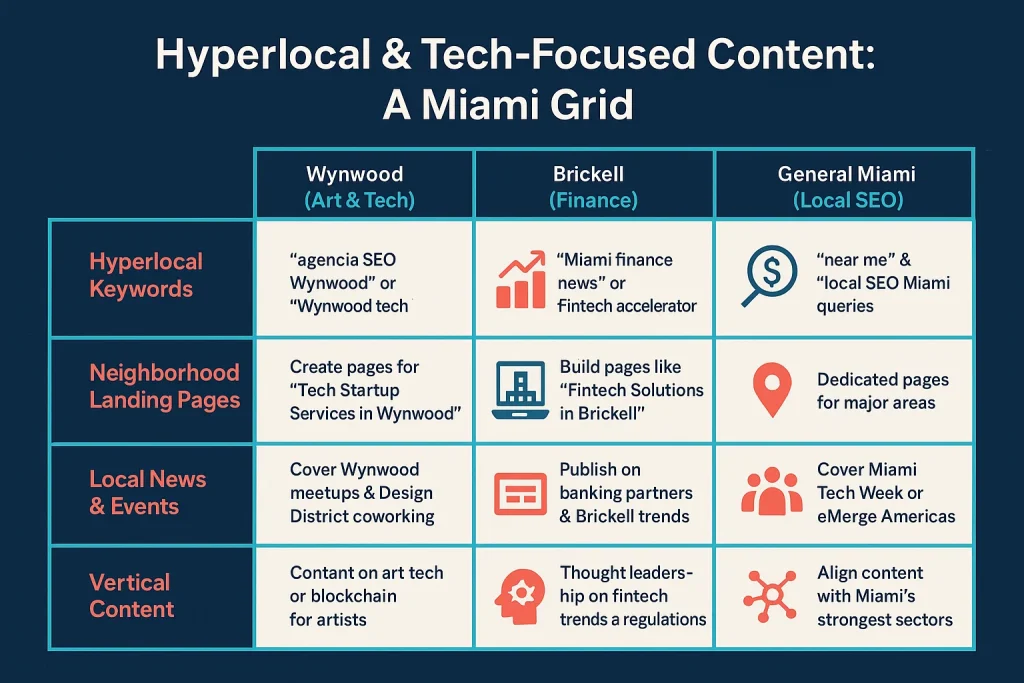
Miami’s visual and vibrant culture also lends itself to multimedia content. Create infographics (like traffic and event schedules), short videos showcasing Miami’s tech spaces, or podcasts interviewing local founders. Optimize all media: use descriptive file names and alt text (including local keywords), and transcribe or caption videos to boost SEO.
In all content, aim for authority and trustworthiness. Especially in sensitive niches like fintech, include executive bios, industry certifications, and citations. Google’s E-A-T (Expertise/Authority/Trust) matters: featuring local experts or partnering with Miami universities can bolster credibility.
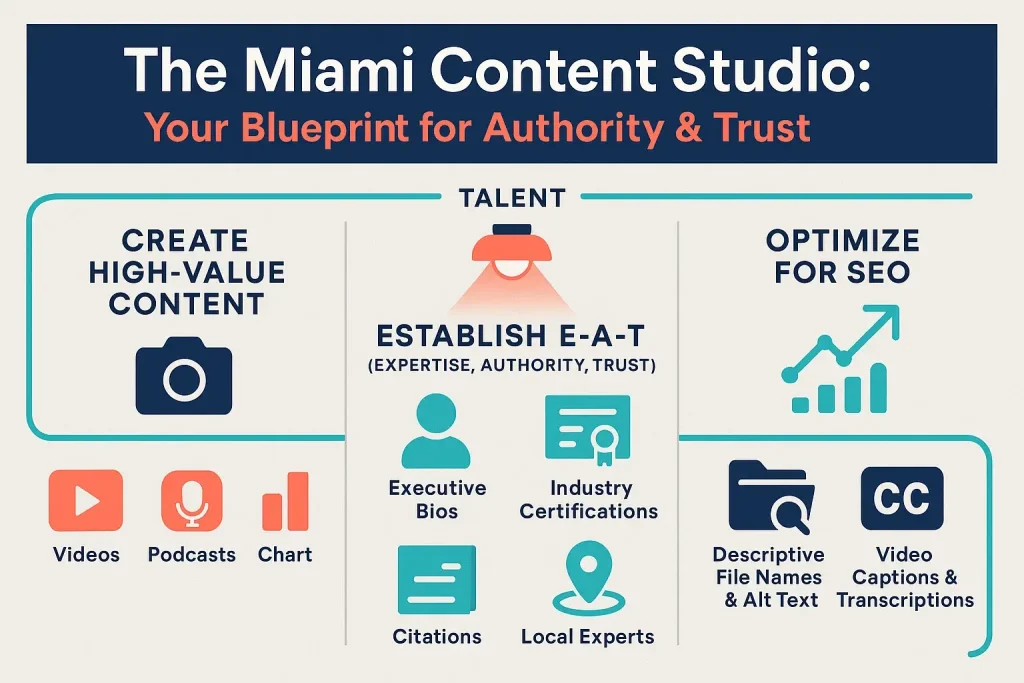
Key Takeaway: Tailor your content to Miami’s world. Publish in both English and Spanish, and focus on local tech topics. By covering Miami’s startups, neighborhoods, and multicultural stories, your content will attract both human readers and search algorithms that prioritize local relevance.
In Miami, local SEO is not optional – it’s essential. Nearly 50% of all Google searches [in Miami] have a local intent. To capture those “Miami tech startup near me” or “bilingual marketing consultant Miami” queries, startups must optimize for the local ecosystem.
A useful framework (below) breaks local SEO into steps: first, target long-tail geo-specific keywords (e.g. “Brickell cybersecurity consultant” or “Wynwood biotech venture capital”), then ensure on-site optimization (fast, mobile-friendly, locally-focused pages), and finally build authoritative local backlinks (e.g. Miami Chamber, tech media). Following this flowchart helps you “dominate local search rankings”.
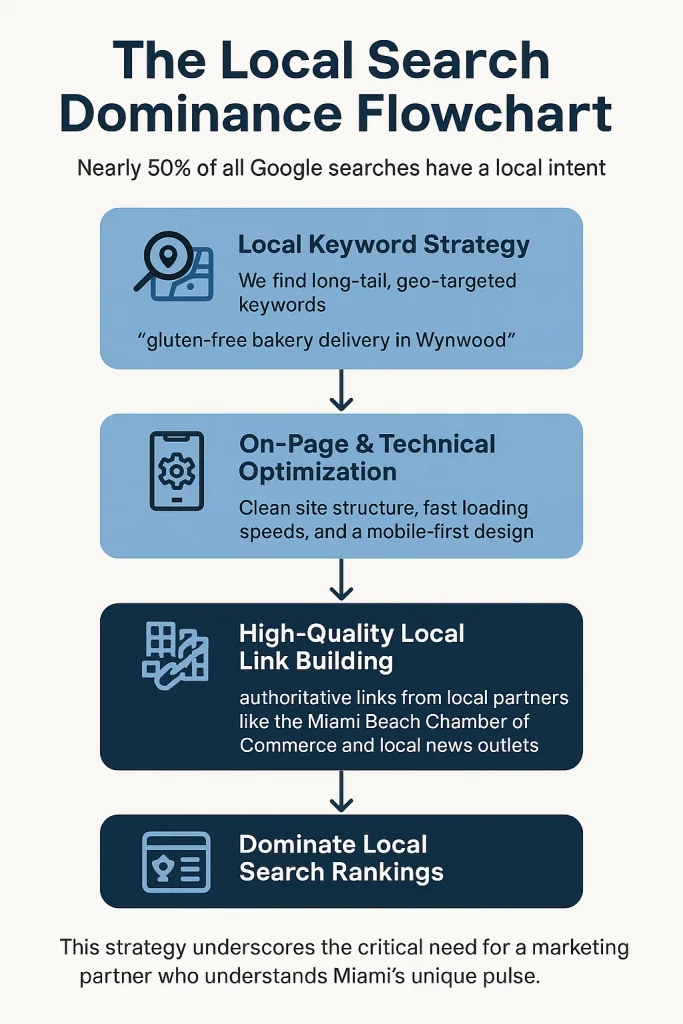
Concretely, key local tactics include:
Google Business Profile (GBP): Claim and optimize your Google Business Profile (formerly Google My Business). Ensure your NAP (name, address, phone) is consistent across all listings. Write a detailed, keyword-rich business description and select relevant categories (e.g. “Internet marketing service” + “Tech startup incubator”). Regularly add posts and photos. Encourage satisfied clients to leave reviews, and promptly reply to reviews (both positive and negative). RankVisibly calls this the “digital storefront” – a well-optimized GBP can land you in Google’s coveted “3-pack” on Maps.
Local Citations: Build citations on Miami-relevant directories. List your startup on local chamber websites, Tech directories (e.g. miamidade.gov/business), and local business listings like Yelp, Cylex, or InsideMiami. Again, consistency in NAP is critical – Google trusts citations more if all your info exactly matches.
Reviews & Reputation: Positive reviews are social proof. Over 90% of consumers read reviews before choosing a local business. For local SEO, consistent 4–5 star reviews on Google (and local Spanish-language review sites) signal trust. Engage with reviewers, and consider showcasing testimonials on your site. The “Three Pillars of Local Authority” highlight that Prominence (positive reviews) and Relevance (local keywords) go hand in hand.
Location Pages & Content: Create pages or blog content specific to your Miami location(s). For example, an “About Us” page could discuss your Miami address and community ties. Blog posts could be framed as “Miami startup [topic]” (e.g., “How Miami’s Fintech Scene is Evolving” or “Latinx Tech Founders in Miami”). Use schema markup like LocalBusiness or Article to reinforce geo-target signals. Our team builds and optimizes these with local SEO services in Miami.
Local Schema Markup: On your website, add schema.org markup for local business (address, coordinates), and for each location page. Use LocalBusiness, as well as any relevant sub-types (e.g. TechCompany, EducationalOrganization). Also use BreadcrumbList schema to clarify site structure.
Neighborhood Targeting: Miami’s neighborhoods (Brickell, Wynwood, Coral Gables, etc.) often have high search volume themselves. Tailor content and ads to those areas. For instance, one blog post could be “Tech Incubators in Brickell” with Brickell-specific references. This geo-targeting will help you rank in those neighborhoods.
By investing in these local elements, your startup will rank higher for queries like “local SEO Miami tech”, “Brickell startup SEO”, or “Wynwood bilingual marketing”. In Miami’s competitive scene, local dominance is non-negotiable.
Link building in Miami is as much about community as it is about SEO juice. Think beyond generic link networks – focus on authoritative, Miami-centric backlinks. Google rewards links that are meaningful to your area and industry. Here are strategic approaches:
Local Partnerships: Collaborate with Miami organizations. For example, sponsor or speak at local tech meetups (e.g. Miami Digital Marketing Meetup) or startup events (RefreshMiami conferences, Mana Tech programs). Event pages and press coverage often link back to partners and speakers.
Press and PR: Get featured in Miami tech media. Pitch newsworthy stories to local outlets like Miami Herald, South Florida Business Journal, RefreshMiami, or Spanish-language media (El Nuevo Herald, Telemundo Miami). A press mention or guest article gives high-quality local links.
University and Incubator Alliances: Miami’s universities (University of Miami, FIU, Nova Southeastern) and incubators (The LAB Miami, CIC Miami) have blogs and resource pages. If you partner on research, internships, or mentorship, they may link to your startup as a resource.
Local Directories: Submit your startup to Miami startup directories, tech listings, or “Top Miami” lists. For instance, listings like “Top 10 Miami fintech startups” or membership in the Miami-Dade Chamber can yield links (RankVisibly specifically mentions partnerships like the Miami Beach Chamber)rankvisibly.com.
Content Syndication: Syndicate articles or infographics on regional business sites. For example, republish blog content on Medium, LinkedIn, or niche sites like Built In Miami (if available) with a backlink to the original.
Community Events: Host or sponsor hackathons, workshops, or charity drives in Miami. Even a small local event can generate buzz and links from event calendars, local bloggers, and social media.
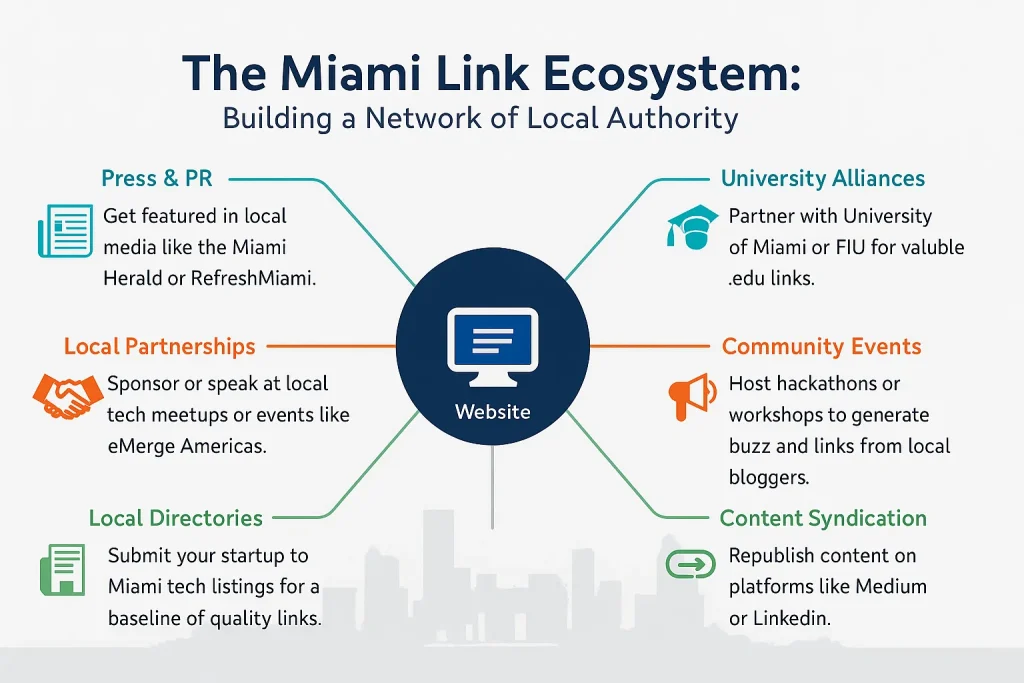
Above all, focus on quality and relevance. A link from a respected Miami tech blog or a .edu/.gov is far more valuable than dozens of random links. High-quality local links (e.g. from the Miami Beach Chamber or Miami tech press) signal to Google that you’re a trusted community member.
Tracking the right metrics ensures your SEO playbook is working. Key Performance Indicators (KPIs) for Miami startups might include:
Organic Traffic Growth: Measure increases in sessions and users from organic search (via Google Analytics). Track over time for each language (English vs Spanish) and by region (e.g., how much traffic comes from Miami vs elsewhere).
Keyword Rankings: Use tools (Ahrefs, SEMrush, Google Search Console) to monitor rankings for your target Miami keywords – both English and Spanish. Watch positions for local terms (e.g. “tech startup Miami”) and industry terms (e.g. “fintech Miami security”).
Local Visibility: Check Google Maps/GBP rankings. Are you appearing in the local 3-pack for relevant searches? Tools like Whitespark or BrightLocal can track local pack rankings by zip code or neighborhood.
Lead Generation / Conversions: For startups, the ultimate goal is often sign-ups or leads. Track conversions tied to organic visits (form fills, downloads, demo requests). Use UTM tags to tie content pieces or campaigns to leads.
Engagement Metrics: Monitor on-page metrics – dwell time, bounce rate – especially for content pages. Improving those may indicate better-aligned content.
Backlink Profile: Keep an eye on new backlinks. A steady stream of high-authority Miami-based links (from .edu, .gov, or major local news sites) is a good sign. Tools like Ahrefs can alert you to new backlinks.
Reviews and Citations: Track your review count and average rating on Google (and Yelp, Facebook, etc.), as well as citations count in local directories. Growth in reviews signals improved prominence.
Mobile Performance: Given Miami’s mobile usage, include PageSpeed/UX metrics for mobile. Google’s Mobile-Friendly Test and Core Web Vitals can be part of a monthly audit.
Set realistic targets: for a new site, a common goal might be to rank in the top 10 for 10 high-intent keywords within 6–12 months. For more mature startups, year-over-year organic traffic growth of 20–50% is a good benchmark. Always tailor KPIs to your business model (B2B leads vs. B2C downloads).
Finally, use analytics to refine strategy. Maybe English content drives more traffic but Spanish content has higher engagement – use that insight to adjust focus. Or if SEO leads spike around local events (as expected), double down on event-related content each year.
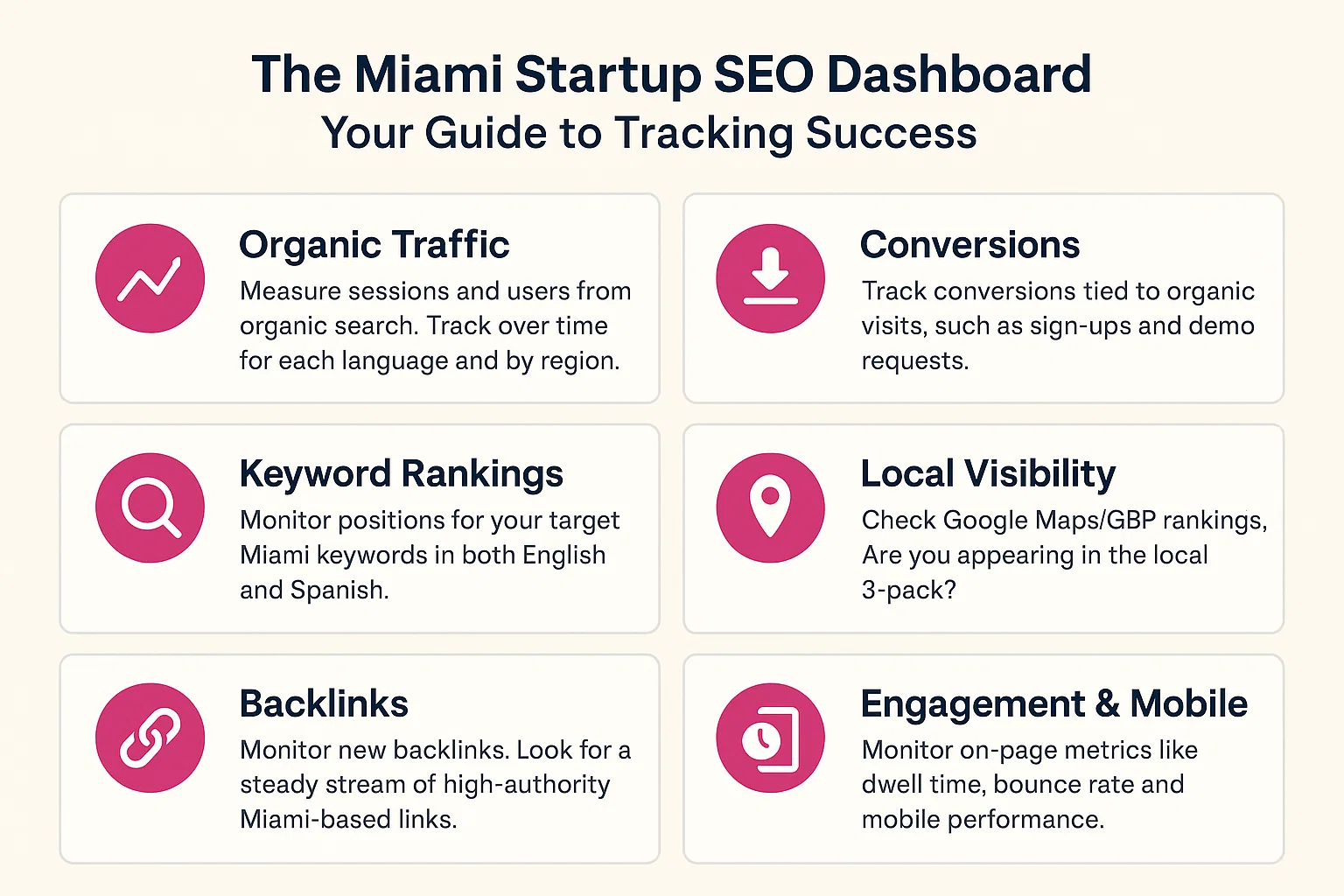
Miami’s tech startup community offers incredible opportunities – but only for those who play by local rules. A successful Miami startup SEO strategy combines global SEO best practices with hyperlocal, bilingual savvy. As the “Miami Pulse” infographic shows, marketing here must be multicultural, technically excellent, and event-aware.
In practice, that means building lightning-fast, mobile-optimized sites (the technical foundation), crafting content in English and Spanish about Miami-relevant topics, and securing local signals (Google Business, neighborhood keywords, and Miami-centric backlinks). For example, a fintech startup should ensure compliance keywords, bank security content, and Spanish-language finance pages, given Miami’s finance culture and large Hispanic community.
By following this playbook – from on-page SEO and site performance to community-focused content and link-building – your Miami-based tech company can capture more of the local market and stand out from the crowd. For professional help, consider specialized Miami SEO services that understand both the data and the local pulse that understand both the data and the local pulse. With the right strategy, your startup can dominate Google’s local search in the Magic City, turning online visibility into real-world growth.
